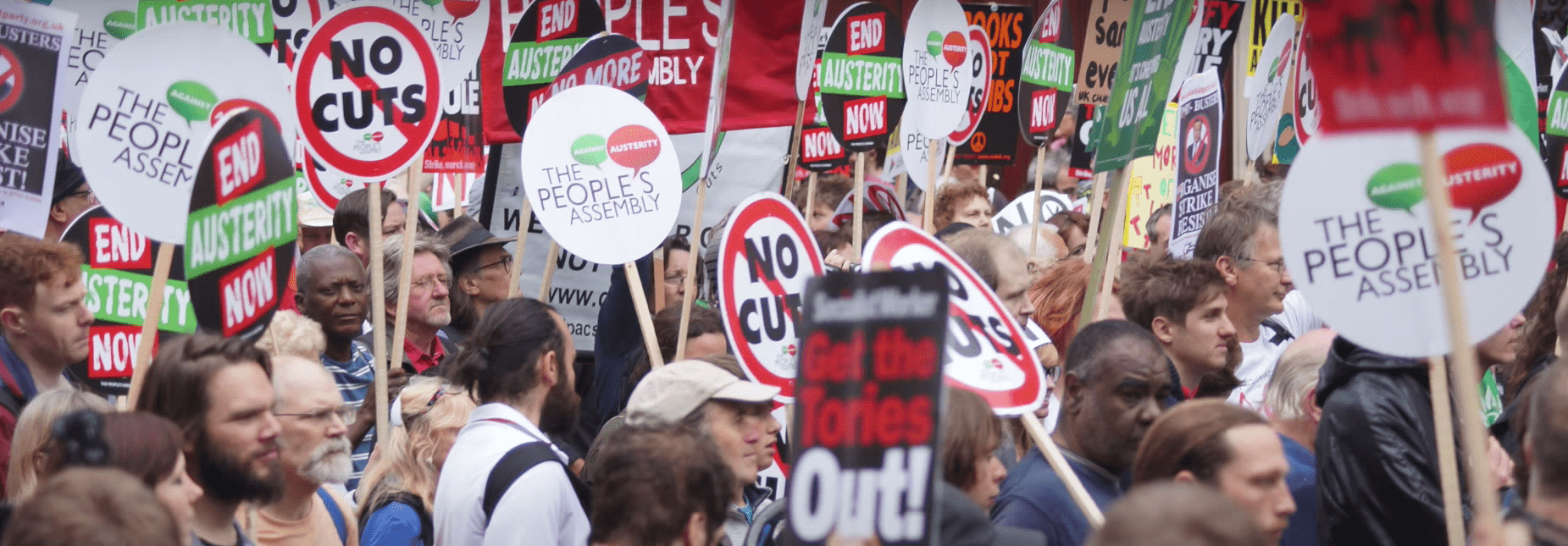By John Pickard
Last week, on the day when more than half a million workers were on strike to defend their living standards, when hundreds of thousands marched to show their anger – including up to 50,000 in London – Labour leader Keir Starmer chose to launch his weekly attack in Prime Minister’s Questions…over Dominic Raab.
Most Labour Party members, probably including some who still support the Starmer leadership, would be astonished to see the disgraceful ‘priority’ the leader showed on Wednesday. Starmer could have chosen a line of attack that highlighted the biggest cuts in living standards in most living people’s memories. Or the fact that food banks – unlike the soup kitchens used by the unemployed in the 1930s – are being widely used by the working poor.
Starmer could have attacked Sunak on the fact that the IMF is predicting a worse economic performance for the UK than for any other G7 country. It seems all of this is less important to Starmer than Sunak’s ‘judgement’ in appointing a bully, Dominic Raab, as a minister.
This is a prime example of what Karl Marx meant when he referred to ‘parliamentary cretinism’. It is an approach to politics that slavishly revolves around the minutia of parliamentary procedure, but ignores the real, living, breathing world outside. But in reality, Starmer, by completely blanking the protests of hundreds of thousands of workers, is showing only one more indication of a leadership alien to the historical traditions of the Labour Party and the wider labour movement.
What are the implications for the future?
It is one more milestone on a downhill road that has led from the radical Labour manifesto of 2019, the content of which was widely popular, to policies – in so far as there are any discernable policies – best described as Tory-lite. Within the left as a whole and especially within the left of the Labour Party – which still exists, despite Starmer’s attempts to eradicate it – there needs to be a serious discussion about how poor the leadership is, and what the implications are for the future.
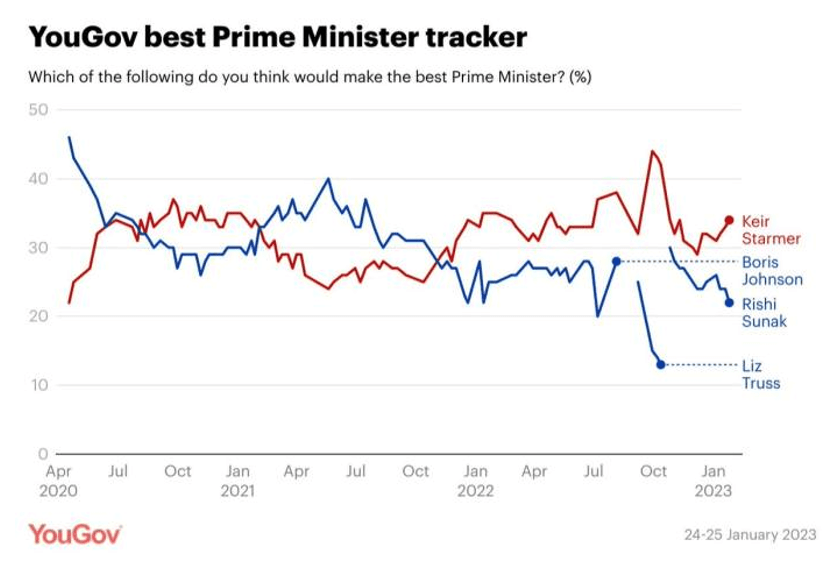
A recent opinion poll by Ipsos-Mori shows clearly that Keir Starmer personally is far less popular than the party he leads. When asked if Keir Starmer has ‘what it takes’ to make a good Prime Minister, only 36% agreed. Not bad, you might think, but actually, 37% disagreed!
A YouGov poll in late January showed a similar outcome (see inset). In both cases, Starmer’s personal lead over Sunak is nowhere near as large as the Labour Party’s lead over the Conservatives, on all of the major issues that will dominate the next general election. The Labour Party is miles ahead in the polls when it comes to voting intentions, so what is the likely outcome, longer term?
The short answer is a Labour victory in the next election. Despite the huge and entirely justified concerns the left might have about Keir Starmer’s Tory-lite strategy, Labour is ahead in the polls because the big majority of voters are not actively engaged in politics, and they have not analysed or considered the political options in the same way that activists do.
Voters’ unspoken and vague misgivings about Starmer – again, entirely understandable, given that he does not exactly ooze sincerity or have the ‘common-touch’ – are more than made up for by a powerful rejection of Toryism and a yearning for something different. Labour is seen as the only viable alternative government.
Those who respond to polls do not look at the small print.
The pall of bureaucracy that has descended on the Labour Party membership, driven by David Evans and his full-time party apparatus, is unseen by the big majority of voters. They are largely unaware of the debates going on in the Party between left and right. Those declaring in polls that it is their intention to vote Labour have not looked at the ‘small print’, and nor will they.
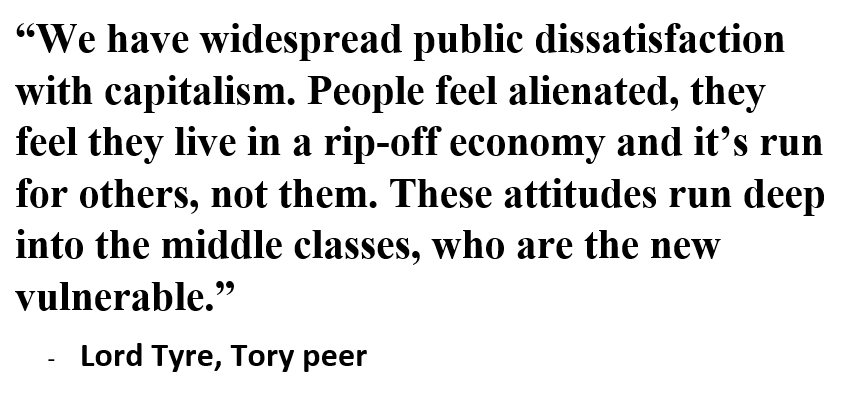
Labour is benefiting from the polls entirely because of revulsion against the perpetual austerity of the Tories and the corruption that this government has fostered. It is apparent to the big majority of the population that the rich are getting richer, while the rest get poorer. It is clear that the NHS and public services are being run down deliberately, not out of economic ‘necessity’ but as a political choice. There is a widespread feeling that ‘enough is enough’ and that is the reason for Labour’s climb in the opinion polls.
The generalised disenchantment with a rigged system was even noted in a recent article in the Financial Times, regarding previously ‘better off’ workers – referred to as the ‘middle’ class – who are also at the sharp end of cuts. Not only that, but it is becoming increasingly difficult to find any redress when one comes up against any big company, utility or government office that is ripping you off.
The middle class and the ‘crisis in capitalism’
Lord Tyrie, the Tory peer and former chair of the Competition and Markets Authority, explained to the Financial Times that there is a widespread disenchantment among even the middle classes and that there is a “crisis in capitalism”. “We have widespread public dissatisfaction with capitalism,” he complained, “People feel alienated, they feel they live in a rip-off economy and it’s run for others, not them. These attitudes run deep into the middle classes, who are the new vulnerable.”
Once upon a time, being a doctor or a schoolteacher would have been considered to be a well-paid ‘middle-class’ profession. Yet as a result of the erosion of their living standards, we have hundreds of thousands of teachers on strike and junior doctors balloting for the same.
Yet just at a time when there is growing disillusionment with capitalism, from the least skilled to the most skilled, from the least well-paid to the better paid, the Labour Party right wing are desperately hanging on to capitalism and doing their best to shore up the system.
Typifying the approach of Labour’s right, Progressive Britain, the right-wing group that was formerly Progress, recently published a paper on ‘the role of modern government’. The author of the paper, as one might expect from this wing of the party, “recently retired from a career in investment management and investment.”
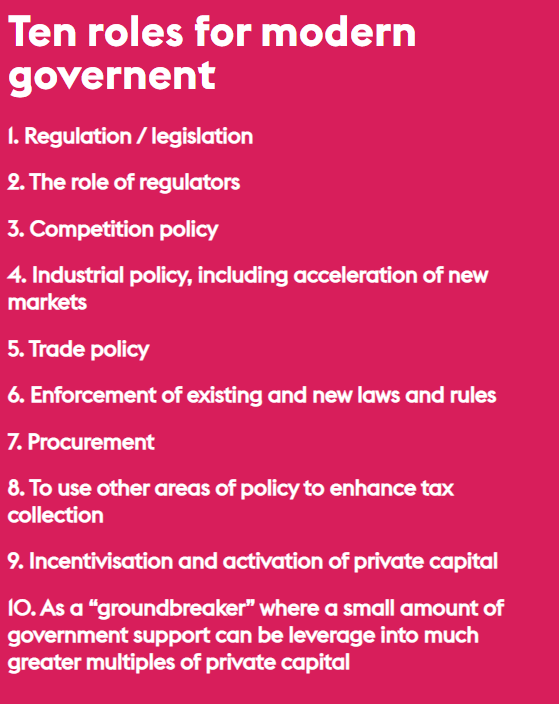
The foreword, by Pat Mcfadden MP, Shadow Chief Secretary to the Treasury, hits the nail bang on the head. “If Labour wins next time, it looks likely that it will be down to us to restore the UK’s financial stability as well as make the changes we all want to see. As Keir Starmer has said, that might mean that some things we want to do – good Labour things – take longer than we would have hoped.” This one sentence says it in a nutshell. The paper as a whole is bland, featureless and vague, but the overall message is this…Labour’s right wing are promising nothing.
Starmer’s overriding policy of ‘fiscal responsibility’
Worse, while there will be some policy fig-leaves to make Labour acceptable to right-wing trade union leaders – policies that cost little or nothing – the overall thrust of right-wing Labour is financial orthodoxy and ‘fiscal responsibility’. There will be no relief for the pressure currently on the NHS or its over-worked and underpaid staff. There will be no keeping public sector wages in line with price rises.
To make sure that a Starmer/Reeves government sticks rigidly to financial orthodoxy, there will be pressure exerted by the Bank of England, the City of London, the media, the judiciary and the tops of the civil service. What voters currently hope to get – a government that offers them some relief from economic insecurity and which will make their lives better – will disappear like a mirage. A Starmer government will be ‘Labour’ government in name only; a government of counter-reforms.
The precise development of events from that point on are difficult to anticipate. There is likely to be very little opposition to this line of policy from within the parliamentary Labour Party. Probably more than at any time in the history of the Party, Labour Members of Parliament – with a couple of dozen exceptions – are utterly remote from the lives of ordinary working class people.
The big majority of them are career politicians, often hand-picked, parachuted into constituencies, with a background at Oxbridge, in academia, the press, business or finance. Look for a former manual worker and you’d be hard pushed to find any. After retiring as MPs, they look forward to the House of Lords and lucrative posts in boardrooms, in no way different to Tory MPs. Having been selected once, they are on a meal-ticket for life and for them, that is the basis of their politics.
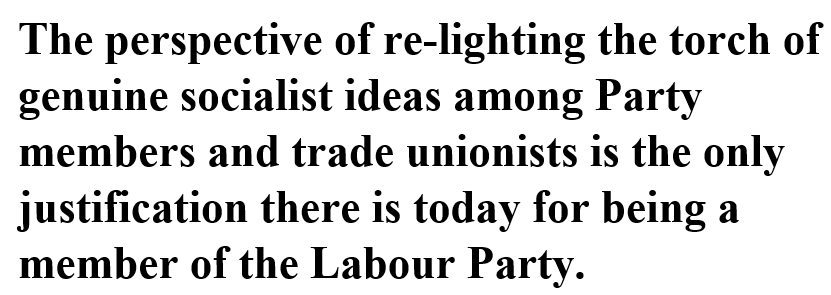
Right wing trade union leaders have, up to now, facilitated Starmer
But what we can be sure about is that there will be opposition to Starmer’s policies elsewhere within the labour movement. Every single Labour government in the past that introduced counter-reforms was opposed by sections of the labour movement, principally the trade unions, Moreover, the longer and the larger the threat of counter-reforms, the greater the opposition became.
It is an open question where that opposition will develop, but it is most likely to be in the trade unions, and especially those affiliated to the Labour Party. Leaders of some of the right wing unions will do their best to ‘hold the line’ in support of ‘their’ Labour government. After all, for the past three years they have facilitated everything that Starmer has done: his push to the right, his expulsion of lefts and all of his efforts to undermine democracy the Party. Must union members are unaware that their leaders support a Labour Party faction clearly opposed to their union policies.
But if a Labour government carries on with wage restraint and public spending restrictions, these same union leaders will come under more pressure than they have ever experienced before from their own members. When that happens, it will re-ignite once again the debate in the Party about what socialism doesn’t mean and what it should mean.
That perspective – raising the possibility of re-lighting the torch of genuine socialist ideas among Party members and trade unionists – is the only justification there is today for being a member of the Labour Party.
Socialist ideas are not complicated. They are based on the simple needs of ordinary workers – for decent wages, affordable housing, a good education for their children, adequate health and public services – and on the need for national wealth to be used to create these things. Public ownership of utilities, finance and big companies and the planned and democratic use of resources to benefit all: the germ of these ideas are already widely popular.
These will once again become the central focus of debate inside the labour movement and it will quickly be apparent – but particularly when they are in government – that Labour’s right wing offer nothing except illusions, smoke and mirrors.
What we have to see is that Keir Starmer is not the Labour Party and the Labour Party is more than just Keir Starmer. He might be the worst leader the Party has ever had, but the Party as a social institution, an idea, and as an aspiration is still intact. It has the affiliation of millions of trade unionists, a membership of hundreds of thousands, and as the next election will show, it can carry the hopes of twelve or thirteen million workers. That is a justification for paying attention to that Party today and for not walking away from it.
The ultimate question is going to be, not how bad Starmer can get, but how long will the trade union movement accept him? And what will they do when they no longer support him.

